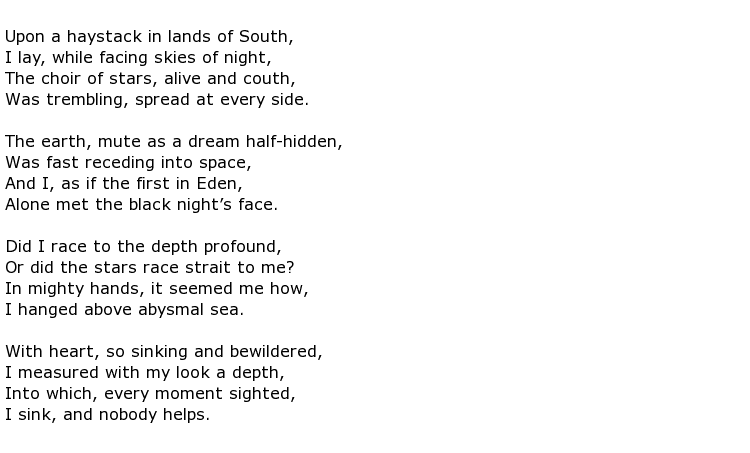 The 19th century Russian poet Afanasy Afanasyevich Fet, a man born of noble blood, is considered to be among the best lyricists in Russian literature. A great friend of Leo Tolstoy, Fet was a deep thinking, often fatalistic poet who wrote a number of poems on the grim subject of death, although he framed these verses to make death sound like something to look forward to. Later in his life he translated many of Schopenhauer’s works into Russian.
The 19th century Russian poet Afanasy Afanasyevich Fet, a man born of noble blood, is considered to be among the best lyricists in Russian literature. A great friend of Leo Tolstoy, Fet was a deep thinking, often fatalistic poet who wrote a number of poems on the grim subject of death, although he framed these verses to make death sound like something to look forward to. Later in his life he translated many of Schopenhauer’s works into Russian.
Some doubts surround the exact date of birth but reports suggest that he was born on the 5th December 1820 which was two years before his Russian nobleman father Afanasy Shenshin married the divorcee Charlotta Foeth in Germany. He was therefore placed into the category known as a raznochinet, literally a person who does not belong to any particular class or state. He was not allowed to take his father’s name of Shenshin and, not surprisingly, all of this was a source of great distress to Fet for the whole of his life.
As soon as he was old enough he was sent away to a boarding school in Estonia and from there he moved to Moscow University in 1838 to study philology. He began writing poetry while at university and was able to publish his first collection in 1840, called The Lyrical Pantheon. Fet really came to the attention of the literary world in 1842 when his poems were seen regularly in magazines such as Moskovityanin and Otechestvennye zapiski, all of which received a great deal of praise from all quarters.
It was another ten years before a second collection came out and this was unusual in that it contained verse and love lyrics composed using mostly nouns and adjectives. This unconventional method of writing was much admired later on by Symbolists such as Annensky, Ivanov and Bely.
In an attempt to somehow re-establish the noble rights that he had been denied he joined the Russian Army in 1845, transferring to the Guards eight years later. Serving in St Petersburg gave him plenty of opportunity to mix with Russian literary figures such as Turgenev and he was soon working on his third collection of poetry. This included a preface by Turgenev and what appeared to be a death wish poem called To Death. Fet wrote it in a way that made death sound almost like an attractive proposition.
He was married to the sister of a literary critic by 1857 and, in the same year, produced a poem which became a favourite of Leo Tolstoy. Tolstoy later became a good friend, both expressing great distaste for liberal critics. Here is that poem – Upon a Haystack on a Southern Night:

Three years later Fet and his wife acquired a country estate and he finally began to live the life of a nobleman without the formality of rank, although this was rectified later by none other than Tsar Aleksandr II himself. The tsar recognised the unfortunate circumstances of Fet’s birth and conferred upon him a hereditary nobleman’s rights and privileges. These were enhanced in 1889 when he was made a Kammerherr, a rank equivalent to a Lord Chamberlain, which the Tsar felt would compensate him further for earlier wrongs.
Afanasy Afanasevich Fet died on the 3rd December 1892, aged 71.

